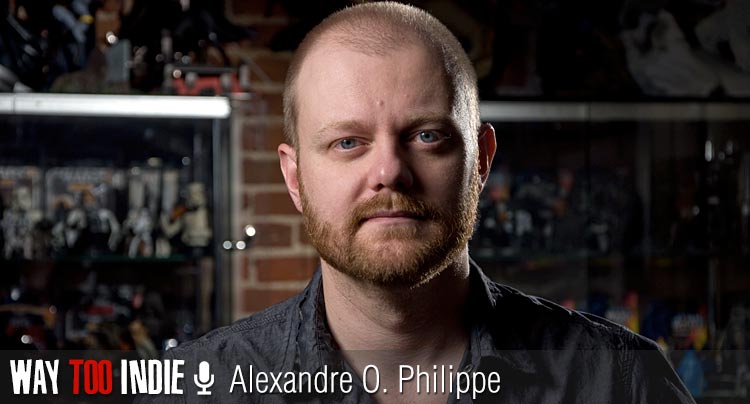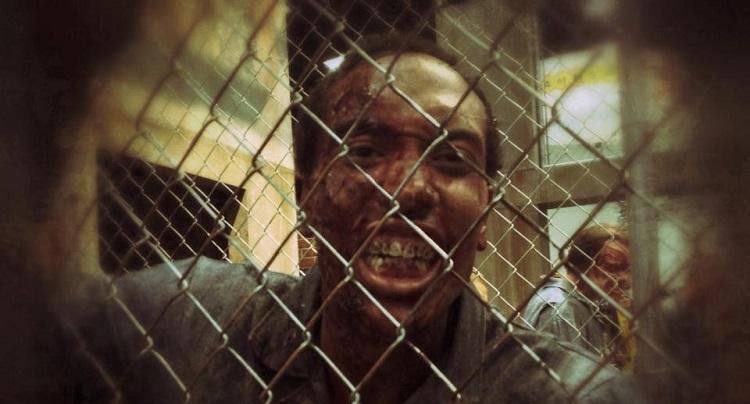‘Doc of the Dead’ Director Alexandre O. Philippe Explains Why Zombies Are So Interesting

In recent years the unthinkable has happened: zombies are finally mainstream. It wasn’t until the 1960s that zombies began to increase in popularity thanks to George A. Romero’s Night of the Living Dead, but they’ve always been on the sidelines of pop culture. Now, with The Walking Dead becoming one of TV’s highest-rated shows, and World War Z making over half a billion dollars worldwide, we can safely say that zombies are “in” right now.
Director Alexandre O. Philippe (The People vs. George Lucas), a self-professed zombie fan since age 6, realized that no one has made a definitive documentary about the zombie. Now Philippe has changed that with his new film Doc of the Dead, a fun documentary exploring the history of zombie culture along with how popular the undead have become today. Philippe interviews people like George A. Romero, Simon Pegg, Bruce Campbell, Tom Savini, and many more, including “zombie scholars.” The film serves as a light, breezy crash course in zombie history while simultaneously exploring all the various ways zombies have embedded themselves into pop culture.
Doc of the Dead screened earlier this year at Hot Docs 2014, and Alexandre O. Philippe was kind enough to sit down with us and discuss his film. For US readers, you can currently see Doc of the Dead right now on Netflix Instant, Amazon Prime, or Epix HD. Canadian audiences will be lucky enough to catch Doc of the Dead on the big screen though, as it will begin to make its way across Cineplex theatres in Canada starting July 11th. See all dates and locations HERE and be sure to read our full interview below!
I’m not aware of any documentaries other than yours that try to make a definitive film about zombies. What made you decide to tackle this subject matter?
I do a lot of pop culture oriented documentaries, so I always try to keep my finger on the pulse of pop culture and trends, what’s happening right now, what’s hot. A few years ago zombies were starting to get into the mainstream in a really big way and I really set out to explore why it’s happening now. I also happen to be a horror fan. I’ve been watching zombie movies since I was 6 years old, so it seemed like a perfect fit.
How long did it take you to make the film?
Two years. I had the idea initially 5 years ago but I was finishing People vs George Lucas and I had committed to The Life and Times of Paul the Psychic Octopus, so really I didn’t get to start until 2 years ago. It turned out to be a really good thing because I was able to catch the wave of The Walking Dead becoming so popular, along with World War Z coming out in theatres. So now I think it’s the perfect time to release a zombie doc.
With this and People vs George Lucas you seem to be making documentaries some would describe as “geeky” or “nerdy.” Are you naturally attracted to these kinds of topics?
Yes, I’m naturally a geek if that’s your question [Laughs]. I’m proud of it. I’m really fascinated by pop culture. I think it’s an extremely important cultural aspect to study and take seriously because it’s fun, and it brings people together. There’s a lot we can learn from pop culture in terms of who we are. When 2 billion people download “Gangnam Style” on YouTube you can’t call it trivial. You have to look at it and say “What is it about this thing that people are so crazy about?” It’s just as valid as some of the heavier or darker topics in other documentaries. That’s why I do it.

Your film covers a lot of ground with such a short runtime. You zip through a lot of information in a very accessible way. How do you structure your film and decide on what to cover?
We had to look at the milestones of zombie culture, the milestones that are part of the answer to the question “Why are zombies so popular today?” This is the way pop culture works. You have several milestones, and then you have a tipping point. All these milestones pile up and they lead to that moment where suddenly it goes from fringe culture to mainstream. This is exactly what happened with zombies.
What are the milestones? Obviously 1968 because of Night of the Living Dead and the other Romero movies coming out after that. Return of the Living Dead because the idea of zombies eating brains comes from that. The Walking Dead was probably the tipping point, as well as World War Z being the first huge Hollywood zombie movie. It’s the first PG-13 huge zombie movie. That’s a game changer. Whether you like it or not it changed everything for zombies.
Did you have any difficulties deciding what areas of zombie films you couldn’t include in the film?
I had to make some really tough decisions in terms of what to include and exclude. People have asked me “Why didn’t you include Lucio Fulci?” or “Why didn’t you include Nazi Zombies?” or whatever. The problem is that if you start getting into that you’re going to have a five hour film. I had to take the shortest route to get to the point of zombie culture. Zombie walks, zombie car washes, zombie runs, all of that stuff right now.
You have a lot of interviews with big names in zombie culture. Was there anyone you really wanted to include but couldn’t?
To be honest I think we got all the important ones. The one I was hoping to get was Danny Boyle, but I knew we wouldn’t get him because he doesn’t think he’s made a zombie movie. So if you approach him saying you’re making a documentary about zombie movies he’s not going to talk to you. I’m not entirely surprised we didn’t get him, but [I think] he made a zombie movie. Sorry Danny! [Laughs]
You dedicate some time to the debate between fast and slow zombies in your film. Where do you stand on fast and slow zombies?
I tend to be very inclusive. There is no one definition of the zombie. I would actually argue that Invasion of the Body Snatchers is actually a form of zombie movie. I’m not talking about the modern flesh-eating zombie we know from Romero’s movies. To me the zombie is the idea that you’re looking at someone you used to know who no longer is capable of thought or emotion. Heck, the Borgs in Star Trek are a form of zombie. I enjoy them all if they’re done well.
Was there anything in your research that surprised you?
When we found out that there’s a clause in the Haitian penal code stating that turning people into zombies is prohibited by law. It’s pretty freaky stuff. When we interviewed Max Beauvoir, who is essentially the Pope of Voodoo in Haiti, he talks about zombification as if it’s just something they do. It’s a spiritual thing is what he says. If that’s not evidence that zombification exists, then what is? It’s pretty freaky stuff.
You let your interview subjects speak a lot on what they personally find fascinating about zombies, so I wanted to ask you the same thing. What is it about zombies that resonates with you?
The obvious answer is that I’m a horror fan and it gives me thrills. Besides that, I think the zombie is really interesting because they’re us and, in that sense, a blank slate. You can project anything you want [on them]. You can think of any theme and use zombies as a story to express that theme. That’s what’s really exciting. I think they’re much more versatile as a movie monster than vampires and werewolves. I think that’s what the world is waking up to right now, their versatility. And I don’t think we’re seeing the end of it, either. Not by a long shot.
